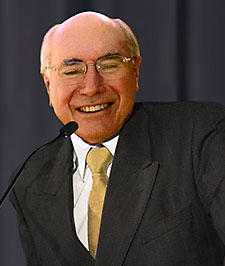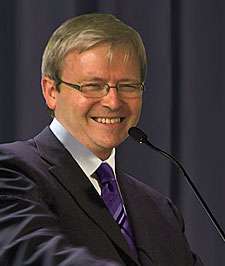Motivated by a desire to "prove' the Christian vote and inform the Christian electorate, the Australian Christian Lobby invited Prime Minister John Howard and Opposition Leader Kevin Rudd to address the Christian constituency for the first time in the lead-up to a federal election. 36 Anglican churches registered to screen the address on August 9 through a live webcast. But what are Sydney Anglicans thinking in the aftermath?
The Australian Christian Lobby's Managing Director, Jim Wallace says the fact that between 80,000 and 100,000 people viewed the webcast shows the weight of the Australian Christian vote.
Mr Wallace says both leaders readily accepted his invitation to address the Christian constituency.
However, while both Mr Howard and Mr Rudd are professing Anglicans, Mr Wallace says their personal religious beliefs were not behind the ACL's decision to run the event.
"We would have done this regardless of the personal faith of these leaders," he says.
The event was deliberately set up in a non-adversarial fashion before the election campaign period kicks in, with each leader addressing the constituency separately.
Both leaders also answered questions and mingled with the Christian leaders present, including Anglicare Sydney's CEO Peter Kell, and Director of the Macquarie Christian Studies Instititute, Dr Greg Clarke.
The mood among Christian leaders after the address was positive, Mr Wallace adds.
"There was certainly a feeling that we've been honoured this way to have these leaders address us," he says.
"There was a feeling of almost relief that the church had been able to present itself in a united way to politicians, in a way that was high-quality and had credibility."
What they said"
Both Mr Howard and Mr Rudd took the opportunity to acknowledge the significant and positive role Christianity has played in Australia's heritage and culture.
 Mr Howard used his address to launch a $189 million internet safety program, which included added resources for the Australian Federal Police to target online predators, and filtering systems for home computers and public libraries.
Mr Howard used his address to launch a $189 million internet safety program, which included added resources for the Australian Federal Police to target online predators, and filtering systems for home computers and public libraries.
Mr Howard said the Judeo-Christian ethic had been the most profound influence on Australian society, and that, while God is neither Liberal nor Labor, people of Christian faith could be found in all parties.
Mr Howard pointed to Australia’s current low unemployment levels, strong economy and social welfare system to argue that the Liberal Government is well-placed and concerned to look after the marginalised and more vulnerable members of society.
Mr Howard briefly addressed climate change and noted the importance of maintaining adequate levels of foreign aid, emphasising the need to deal with the corruption of authorities in needy countries around the globe.
He also thanked the "silent toiling members of the Christian church in Australia" for their "immeasurable" contribution to Australian society.
 Mr Rudd said Australians should be proud of our Christian heritage and spoke about his “garden variety Christian faith” and its effect on his own values and political thought.
Mr Rudd said Australians should be proud of our Christian heritage and spoke about his “garden variety Christian faith” and its effect on his own values and political thought.
The dilemmas faced by Australian families, namely managing time and making ends meet, formed one of Mr Rudd's main focus points, prompting him to announce that a family impact statement would be prepared for every submission to cabinet, should the Labor government win the next election.
He spoke of the need to make housing more affordable and improve education opportunities in early childhood, and for high-schoolers interested in training for trades.
Climate change policy " including a national carbon target " and raising Australia's foreign aid contribution were also mentioned.
Mr Rudd lamented the plight of Christians affected by the war in Iraq, and called on Australia, as a “creative and humane middle power” to have “hard heads and soft hearts”.
What we thought"
An appreciation that these prominent leaders addressed Christians and answered their questions was a common thread among the parishioners interviewed at St Paul's, Castle Hill.
"It's excellent to see that the two people going for prime minister are both Christian and they're not afraid to get up and say it, and they're not afraid to hold a conference that specifically addresses Christian leaders in a day and age where everyone is too concerned about political correctness," said young worker Melissa Hohnen.
However Mrs Hohnen also says the proof of the Christian political pudding will be in the eating, after the election.
"Kevin Rudd gave some statistics about how large the Christian group is and you think, are they thinking votes or are they thinking, ‘these are people that we want to take care of and we share the same values so therefore that's what's going to shape our policies’?."
Opinions were evenly divided between Mr Howard and Mr Rudd.
"Mr Rudd expressed much more of a personal view on how his own values would interact with his political decision-making process," said parishioner Neville Eldridge.
"I actually found Howard warmer," said parishioner Mark Stephens. "Rudd doesn't quite sound as "common man', whereas Howard just seemed to connect a little better on that."
However other comments indicated that the character of a party's leader was not the only thing Christians were looking out for.
"On the downside, it's just them personally," says parishioner Kay Eldridge.
"And you think of the Liberal Party and the Labor Party behind them and that there'd be lots of people in those parties who would not hold either of the views that they expressed tonight.”
Some issues ranging from climate change to foreign aid resonated with contributors.
"Mr Rudd gave me hope for the future," says Mrs Eldridge of the opposition leader's immigration policy.
"I liked the way he dealt with the history of how Australia has dealt with the influx of migration that we've had and how he would see that as relating to the future if his party was elected."
The absence of some issues was also noted.
"I thought stem cell research was going to be a hot issue and no one actually really discussed it," Mrs Hohnen says.
"There probably weren't as many action points as I thought there might have been, but I thought it was informative and covered relevant and topical issues."
Mr Stephens says the event itself was a fascinating indication of the Christian make-up of Australia's current leaders, but doubts the event would have worked with other politicians.
"I think it's a significant election in terms of the transparency and prominence of Christian faith in both the lives of the leaders," he says.
"The personalities seem to be uniquely suited to this kind of exchange. They both know how to talk to the Christian community " I think some others would freak them out."
Still waiting for answers
Jamberoo Anglican Church rector and keen political watcher, the Rev Glenn Farrell says Christian leaders asked some good questions " on subjects such as the achievement of Millennium Development Goals, religious vilification laws and helping Australians achieve a healthy work-life balance.
But Mr Farrell observed in his parish a disappointment with the intensity of the questions asked by church leaders.
"With the exception of Peter Kell's question and some others, the general feeling was that the questions lacked substance and were simply buttering up the leaders," he says.
While Kevin Rudd spoke convincingly on issues that resonated strongly with Jamberoo residents, Mr Farrell says people in his parish felt some important questions went unanswered.
"I think Kevin Rudd may have won over some Liberal voters " except for that last question (on religious vilification laws)," he says.
"It's a fairly crucial issue for us " we wouldn't want to lose the right to preach the gospel through silence and inactivity."
























